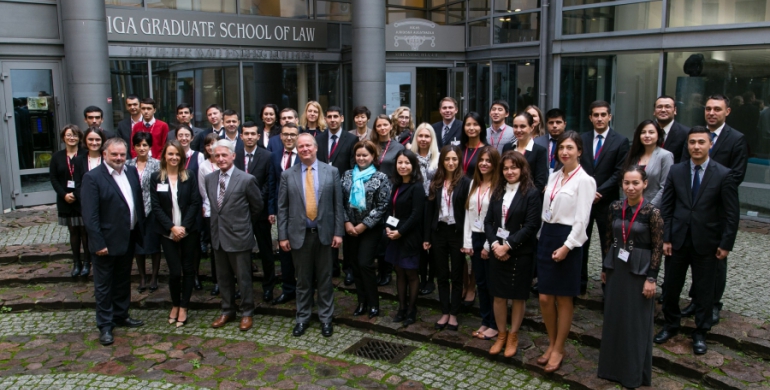On Monday, 28 September, Riga Graduate School of Law opened the third session of the Advanced Programme in Law and Economics for the European Neighbourhood Policy Countries and Central Asia. A group of 39 professionals representing public administration and non-governmental organisations from eleven countries will study law and economics during the three month intensive programme that has focus on both the European Union and international relations. The primary objective of the programme is the further transfer of experience and knowledge from Latvia and the other donor countries in order to support public administration and civil society capacity. In the longer term, the programme aims to strengthen relations both between the participating countries and with the international community, including the European Union, especially in the area of economic and security policy.
The programme is implemented for the third time in cooperation with the Ministry of Foreign Affairs of the Republic of Latvia, and it is partly financed from the Latvian national budget in the framework of the cooperation development policy. Due to the successful implementation of the programme in 2014 and in the spring of 2015, the circle of the programme donors has grown. Significant financial contributions have been provided by governments of the United States, Switzerland, Sweden, and Norway, thus allowing an intake of more than twice as many participants as at the first rounds of the programme, while Latvia supports only a limited number of participants.
Andrejs Pildegovičs,State Secretary of the Ministry of Foreign Affairs of the Republic of Latvia noted that the Eastern Neighbourhood Policy Countries and Central Asia are important partners for Latvia, and this was evidenced by the priorities set for the Latvian Presidency of the Council of the European Union. Sharing the experience that Latvia has gained over the past 25 years, as well as investing in the education of future leaders, constitutes the best that any country can offer its partners.
George Ulrich, rector of RGSL, added that that young professionals returning to their countries will be able to use the newly acquired knowledge, promote cooperation with colleagues from other countries in their area, successfully develop and guide the relationship with their partners in the European Union and the international community. Understanding how the international relations are managed, and applying the experience of Latvia and the other donor countries, is central to the programme. Each component of the training, including daily discussions and study visits, is focused on individual development, which will be beneficial also for the institutions and organisations represented by the participants.
Overall, the advanced programme has received more than 350 qualified applications, from which 39 participants were selected. The programme participants represent Armenia, Azerbaijan, Belarus, Georgia, Kazakhstan, Kyrgyzstan, Moldova, Tajikistan, Turkmenistan, Ukraine and Uzbekistan. The programme will last for three months, ending on 18 December.
Courses at the programme will be taught by lecturers from the European Institute for Public Administration, the Latvian Institute of International Affairs, the Stockholm School of Economics in Riga, and the University of Latvia.
Please refer any questions on the programme to Ms. Anete Jurcika, Programme Coordinator, at advanced(abols)rgsl.edu.lv">advanced(abols)rgsl.edu.lv.

